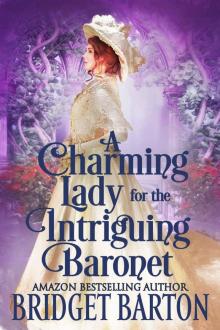- Home
- Bridget Barton
Once Upon a Dreamy Match: A Historical Regency Romance Book Page 3
Once Upon a Dreamy Match: A Historical Regency Romance Book Read online
Page 3
It seated twenty people, which would fill out a modest dinner party. Each chair was crafted from the same wood, which complemented the rest of Manor’s architecture. The walls were a pale contrast to the dark accents of the furniture and all around were splashes of colour in the finery and accessories.
Once the maids finished, Lady Vivian thanked them before she turned to her son, who was still staring out the window. “You are already in your twenty-second year. It is time that you began to more earnestly consider the prospect of marriage.”
It wasn’t that such a conversation bored Benedict – it was just that courtship and matrimony were not high on his list of priorities. After all, he was Lord of the Manor and had enough responsibilities as it were. He considered his mother’s words but was more interested in her intent.
Benedict was constantly worrying for his mother, since she was now a widow. He often thought she was lonely for company and wished him to marry so that she had someone else about the property to talk to. His mother was choosy with her company and he did not doubt that she would have quite the opinion on his stepping into the London scene.
She continued on the topic. “I beg of you Benedict, head to London. A marriage promises a future.”
He sighed forlornly, hearing her words but not turning towards her yet. He kept his eyes on the world beyond the window, trailing his gaze from the fountain directly beneath him, down the long drive, to the lake a half mile away. The sky was beautiful today, a perfect blue flecked with clouds. The thought of going outside filled him with want of peace. He treasured his moments alone where he could reflect on what the future held for him in solitude.
But his mother still spoke from behind him. Not wanting to upset her, he turned and joined her at the table. Taking a seat at the head, he examined the abundant spread before him. He was entirely aware, of course, that his mind was wondering to a whole manner of subjects apart from what was currently being discussed.
With effort, he met his mother’s eyes at last. “I have no interest in such things, mother. My day to day life is complex enough without adding an unnecessary romance.”
She tutted at this. “My darling, the romance is not the necessary part. Your father – may his soul rest easy – would want to see his lineage continue. I would like to see his lineage continued. Your responsibilities to this family and to Hedingham do not start and end with this Manor.”
He knew that she spoke the truth, and that having a family was of the utmost importance. It was the role of any citizen in any society, was it not? To create and rear children, to maintain the family and further the line? Especially when the Gildon’s position was of such importance to society. But the thought of all that goes into raising children, the time he would have to spend away in order to engage in all those things leading to an adequate marriage – it all seemed so exhausting, and a distraction when there are so many others things he would rather be attending to.
“A sensible marriage is one that brings security; security, good title, sociability and a healthy lineage. It is just the way of life, my dear.” His mother paused as food was served. She took a sip of wine before going on. “I know you are young, but I hope you can understand the importance of your position.”
Benedict nodded at her. “I can; I do.”
He does, of course he does. He had learned of his title and what the position meant when he was young. He had been groomed for his father’s succession since the day he was born. Title and appearance were everything in this world of aristocracy. The Gildon’s had a certain perception to maintain, and it was Benedict’s sole responsibility to maintain this alongside Hedingham itself.
As the only child of Lord and Lady Gildon, there was no other person the family could turn to; there was no other way around it. Whether he enjoyed the idea of marriage or not, and whether he was ready for such a life commitment, was irrelevant, and certainly not the concern of Lady Vivian. Duty was paramount.
They ate in silence for some time with Lady Vivian allowing her son to ruminate on the suggestion she made to him. It was not her wish to overwhelm her son, but there was so much he had yet to show any interest in. That was a concern of hers, for though as a man he was granted the natural gift of time, securing a marriage would bring relevance back to the family.
The Gildons had not so much between the topic of conversation in Essex since the passing of her husband, and that was so long ago already. It was important to show the townsfolk that the Gildons still commanded respect and were a family worthy of their attentions.
This season in London presented new opportunities and it would be such a pity for him to miss out. Who knew what chances could pass him by if he were to stay on at the Manor? His responsibilities were many, but he owed the family just as much as he owed the home. He felt this pressure every day. There were certain things, certain necessities that he took in his stride, but the proposition of marriage, of courtship, just did not seem to be one of priority at this time.
As a man he had the luxury of time; he played into this fact whenever Lady Vivian broached this subject. All he wished for was more time, which for Benedict didn’t seem so enormous an ask. Evidently, his mother seemed to feel very differently on the subject.
“Imagine how much life a child would bring into this home. Oh, now imagine more than one! Perhaps that is exactly what the Manor needs, Benedict: new life. You must be the one to keep Hedingham alive.”
She allowed the silence to stretch while they continued on with the meal. Benedict was appreciative of the spread before him, but it did little to whet his appetite. Normally such talks of responsibility would take place later in the evening when all of his other daily duties had been attended too. There must have been something in the air today to make all the day’s proceedings so different. He attempted to keep lunching, each time working hard to allay his mother’s concerns for the welfare of their family.
Mercifully, the butler made a sudden entrance. He bowed before announcing the arrival of one Miss Daphne Blanton, a proclamation that caused Benedict to get at once to his feet. If only he had been standing by the window! He would not have been so surprised by her arrival. Not that he at all considered her stopping in to be any kind of inconvenience, quite the opposite in fact – he thoroughly enjoyed the company of his oldest and dearest friend.
She entered then and it was immediately apparent that she had walked the distance to arrive here. Why had she not taken a carriage? Why had she not sent word for Lord Gildon to arrange one for her? Perhaps the goal was for this excursion to be a surprise for Benedict and his mother. If that was her intention, she had succeeded on all fronts.
“Ah, Miss Blanton!” Lady Vivian rose alongside her son to greet the girl. Her own affections for Daphne were long and genuine, having had much to do with the girl since her childhood. In fact, she considered herself a caretaker of the girl in many ways, particularly since the death of dear Mrs. Blanton.
Lady Vivian stopped short of her advance to take the full measure of Daphne’s appearance: the hem of her skirt was soiled, likely due to the long walk she had taken to get here. Her hair was windswept, giving her a wild look. The girl’s normally even complexion was flushed from effort. She had every appearance of a girl who look chased by something.
“Daphne, dear, did you come alone?” Lady Vivian asked. She made eye contact with the butler, who shook his head in response. Returning her gaze to her guest, she added, “I see no chaperone with you.”
“Good morning, Lady Gildon–” Daphne paused to offer Vivian a curtsey, then turned to Benedict with a smile –“Lord Gildon.”
He returned her smile with a warmth that equalled her own.
After a brief moment, Daphne returned her gaze to Vivian to address the Lady’s question. “Yes, Lady Vivian, I did come alone this morning. But please do not fret – I found the walk to be quite refreshing.”
Lady Vivian scrutinised her appearance once more. In her mind, refreshing seemed an interesting choice of wo
rd. “It is quite unbecoming to be so reckless with one’s self, Daphne.”
Daphne would have known that Lady Vivian would be prompted to this kind of response. She was as familiar with the Lady’s character as she had been with her own mother’s. Whatever the reason for her being here, and for her arrival in the manner that she had, she must have a valid story to make up for it.
Benedict began to wonder what had happened in Daphne’s life lately for her to be so brazen in her appearance here today. It had not been especially long since the two had seen one another, but with his recent influx of responsibilities, the time he allowed himself to partake in casual encounters had decreased. The two had taken to writing each other out of sheer convenience rather than making the journey between each of their abodes.
“You ought to have sent word ahead,” Benedict said then, leaving the table to address his friend. “I would have been more than happy to arrange travel for you.”
Daphne nodded at him. “Thank you for the offer, and I would have done so had today’s visit not been so impromptu. I do apologise for my appearance, I meant not offence by it.”
She was sincere, and Benedict could not help but stifle a laugh at how serious her expression became. Did she think them so removed from her after spending only a short time apart?
“Honestly, I find this new look of yours to be quite in style.”
He was making a mockery of her, and Daphne knew it. Her expression relaxed immediately. She knew he was of too soft a soul to make her feel embarrassment over something as shallow as her dress. After all, she had walked the miles to be here. They could expect nothing less. And as he thought, there was surely some reasonable justification for it. She took his teasing in her stride, curtseying again.
“Don’t you agree, mother?” Benedict continued. “You look to be in good spirits with such a healthy flush upon the cheeks. Perhaps travelling alone suits you.”
Daphne laughed behind her hand and shook her head. Her dark hair had broken free of its confines and danced around her shoulders as she did so. “You are too kind, Lord Gildon.”
“Please, you know I insist you call me by my name. When have we ever been so formal?”
“My apologies, Benedict.” She had not stopped smiling since she had made her entry. The banter between them had always bought joy to their faces. Conversation was always so easy among friends.
He gestured back to the table and at the spread that lay in wait. “Will you join us, Daphne?”
She glanced at Lady Vivian for confirmation before joining them at the table. She settled herself across from the Lady at Benedict’s other side and tried to smooth out her appearance. She likely wished she had made a detour to allow herself a better effort to amending her hair and face, but it would not have mattered, for her dress was still stained at the bottom.
Benedict hid his laughter at the less-than-subtle attempt she made to tame her windswept hair.
“Leave it,” he said to her. “I mean what I say – the wild look suits you. I admire your tenacity in making the journey here.” Then, turning to his plate, he added, “If only there were more women as bold as you in this world, Daphne. I would be married already.”
Daphne laughed aloud, the lovely sound bouncing off the walls and resonating in Benedict’s ears. “Oh Benedict, you tease me so.”
Lady Vivian, however, was not laughing. Instead her face was tight, her mouth drawn. Her familiarity was gone and her tone was sharp. “You shouldn’t say such things, my son.”
Benedict regained his composure as he watched the laughter slip from Daphne’s lips. He sat straighter in his chair and turned to face his mother. Though she was always more stringent in her propriety, he was shocked by the severity of her tone. “Why ever not?”
“He only means to jest,” Daphne added quickly to diffuse the growing tension.
“I mean no offence, Daphne, of course,” Lady Vivian went on, dropping her fork from her lips. She said those words and yet her tone remained the same. Something within her must have undergone a recent shift. “But you are a merchant’s daughter. It would not be an acceptable pairing.”
Silence pervaded the table. None of the three were eating. Could Lady Vivian’s sudden change in personality, which was usually so easy-going around the merchant’s daughter, have something to do with their discussion that very morning? Was she so invested in the worth of a suitable wife that she would scoff at something as harmless as a jest?
Benedict released a breath. “Mother–”
“She is not gentry, my son. Your marriage must be within our own class. It is the natural order of things–”
“Do not talk about Daphne as if she is not right now sitting before you.” Benedict’s interruption invited another tense quiet to the table.
Lady Vivian frowned at her son, amazed by his outburst. It seemed that the morning had each brought them some level of surprise. How had they gone from this morning’s calm conversation to bickering so quickly? Moreover, how could even his Lady mother be so invested in the subject that she would be insensitive to their company? Daphne remained wordless, head down, plate of food entirely untouched. It had not been ten minutes past since she entered this establishment, and already the mood had soured beyond comparison.
“Again,” Lady Vivian said, “I do not say this to be offensive.” To Daphne, she added, “This is factual, not personal. You know I think of you like a daughter, Daphne. I have known you since you were a babe. Our families have been linked for as long as both of you can remember.”
“I understand, Lady Vivian,” Daphne cut in. She knew it was practically blasphemous to interrupt a Lady, but she did not wish for Vivian to humiliate either of them further with her lecture of appropriate social etiquette. “It was a jest. Nothing more. I would never take such a proposition seriously.”
Benedict looked at her, her downcast eyes, her avoidant gaze. Her discomfort permeated all corners of the large room. He felt it as if the feeling lived inside his own heart.
He cleared his throat. “Thank you, mother, for your concern. We have already discussed at length your opinions on an appropriate match for me.”
Daphne raised her eyes from the table to look at him, a gentle crease grazing her forehead. She was not privy to this conversation, obviously, and it was likely uncouth to raise a subject she was uninvolved with, but Benedict excused his own rudeness on behalf of their continuation of the meal in peace.
“Let us leave this subject then,” Lady Vivian concurred. She glanced between her two of them and, seemingly satisfied that the conversation has indeed closed, goes right on ahead eating. Reluctantly and after a brief exchange of eyes, Daphne and Benedict go on to eat as well. But it is short-lived, for eventually Benedict rises from his plate of mostly untouched food.
“I am not altogether hungry at the moment. I will take my lunch later.” This statement was directed to his mother. He turns to Daphne then, noting her plate is very much similar to his own. Extending his hand, he then asks, “Would you care to accompany me on a check of the estate, Miss Blanton?”
His use of formality was surely a pinch at the manners of his mother, who narrowed her brow at him, but did not speak. Daphne nodded, took his arm, and rose from the table.
“I would very much enjoy that, Lord Gildon.” She thanks Lady Vivian for her hospitality, her own gentle eyes meeting the reserved ones of her hostess. She bid her farewell, and together she and Benedict departed from the dining room.
Chapter 3
Hedingham Estate Grounds
Hedingham Stables were a short walk from the main house, located behind the kitchens and tucked in beside the extensive vegetable garden. The air smelled like freshly dug earth and sweet, ripened fruits. The sky was the same incredible blue as the cornflowers that bordered the pebbled pathway that connected the rear of the Manor to the entrance of the barn.
Though she had walked these pathways many a time, both as a child and now as a woman, Daphne could never help but marvel at
the beauty of this place. Everything from its structure and layout to the architecture and design was simply astounding to her. That she and Benedict lived such different lives and yet had remained so close – both in location and in heart – was a true wonder for her.

 A Lady's Perfect Match: A Historical Regency Romance Book
A Lady's Perfect Match: A Historical Regency Romance Book Falling for the Mysterious Viscount: A Historical Regency Romance Book
Falling for the Mysterious Viscount: A Historical Regency Romance Book Love Stories of Enchanting Ladies: A Historical Regency Romance Collection
Love Stories of Enchanting Ladies: A Historical Regency Romance Collection A Courtship to Remember: A Historical Regency Romance Book
A Courtship to Remember: A Historical Regency Romance Book Longing for a Liberating Love: A Historical Regency Romance Book
Longing for a Liberating Love: A Historical Regency Romance Book Regency Romance Collection
Regency Romance Collection A Baron Worth Loving: A Historical Regency Romance Book
A Baron Worth Loving: A Historical Regency Romance Book Lords to Be Enamored With: A Historical Regency Romance Collection
Lords to Be Enamored With: A Historical Regency Romance Collection A Lady for the Forsaken Earl: A Historical Regency Romance Book
A Lady for the Forsaken Earl: A Historical Regency Romance Book Dukes to Fall in Love With: A Historical Regency Romance Collection
Dukes to Fall in Love With: A Historical Regency Romance Collection The Way to Capture a Marquess's Heart: A Historical Regency Romance Book
The Way to Capture a Marquess's Heart: A Historical Regency Romance Book The Lost Love of a Stunning Lady: A Historical Regency Romance Book
The Lost Love of a Stunning Lady: A Historical Regency Romance Book Once Upon a Dreamy Match: A Historical Regency Romance Book
Once Upon a Dreamy Match: A Historical Regency Romance Book A Charming Lady for the Intriguing Baronet: A Historical Regency Romance Book
A Charming Lady for the Intriguing Baronet: A Historical Regency Romance Book A Governess for the Brooding Duke: A Historical Regency Romance Book
A Governess for the Brooding Duke: A Historical Regency Romance Book Mending the Duke's Heart: A Historical Regency Romance Book
Mending the Duke's Heart: A Historical Regency Romance Book A Bride for the Betrayed Earl
A Bride for the Betrayed Earl A Soulmate for the Heartbroken Duke
A Soulmate for the Heartbroken Duke A Lady for the Brazen Earl: A Historical Regency Romance Book
A Lady for the Brazen Earl: A Historical Regency Romance Book For the Love of a Duchess: A Historical Regency Romance Book
For the Love of a Duchess: A Historical Regency Romance Book A Damsel for the Mysterious Duke: A Historical Regency Romance Book
A Damsel for the Mysterious Duke: A Historical Regency Romance Book The Revenge of the Betrayed Duke: A Historical Regency Romance Book
The Revenge of the Betrayed Duke: A Historical Regency Romance Book A Damsel for the Daring Duke
A Damsel for the Daring Duke Regency Romance Collection: Regency Fire: The Historical Regency Romance Complete Series (Books 1-5)
Regency Romance Collection: Regency Fire: The Historical Regency Romance Complete Series (Books 1-5) A Damsel for the Mysterious Duke_A Historical Regency Romance
A Damsel for the Mysterious Duke_A Historical Regency Romance A Damsel for the Daring Duke_A Historical Regency Romance
A Damsel for the Daring Duke_A Historical Regency Romance Falling for the Heartbroken Duke: A Historical Regency Romance Book
Falling for the Heartbroken Duke: A Historical Regency Romance Book A Soulmate for the Heartbroken Duke: A Historical Regency Romance Book
A Soulmate for the Heartbroken Duke: A Historical Regency Romance Book A Damsel for the Daring Duke: A Historical Regency Romance Book
A Damsel for the Daring Duke: A Historical Regency Romance Book A Soulmate for the Heartbroken Duke_A Historical Regency Romance
A Soulmate for the Heartbroken Duke_A Historical Regency Romance A Damsel for the Mysterious Duke
A Damsel for the Mysterious Duke A Beauty for the Scarred Duke: A Historical Regency Romance Book
A Beauty for the Scarred Duke: A Historical Regency Romance Book Kind Ella and the Charming Duke_A Historical Regency Romance
Kind Ella and the Charming Duke_A Historical Regency Romance Kind Ella and the Charming Duke
Kind Ella and the Charming Duke